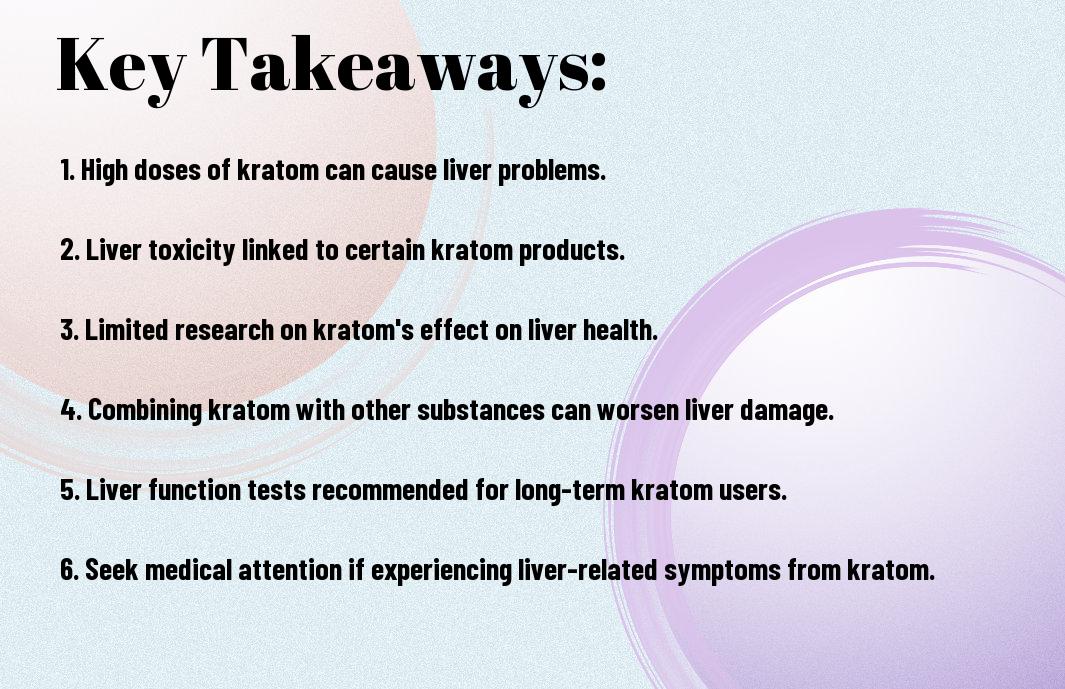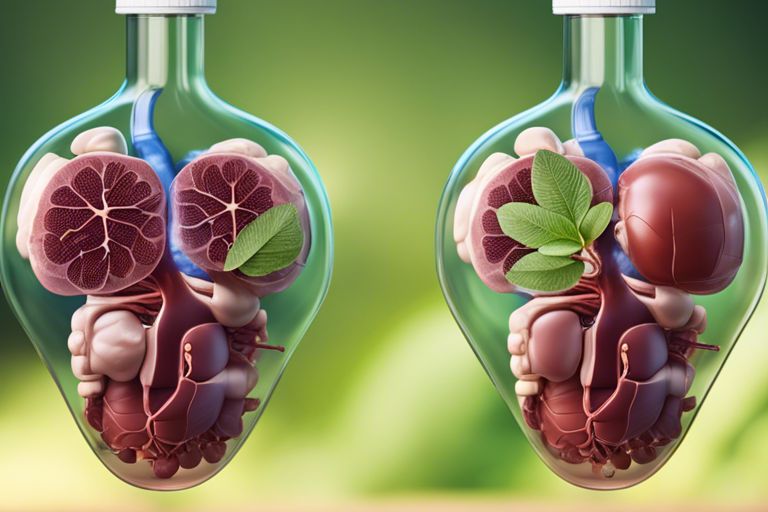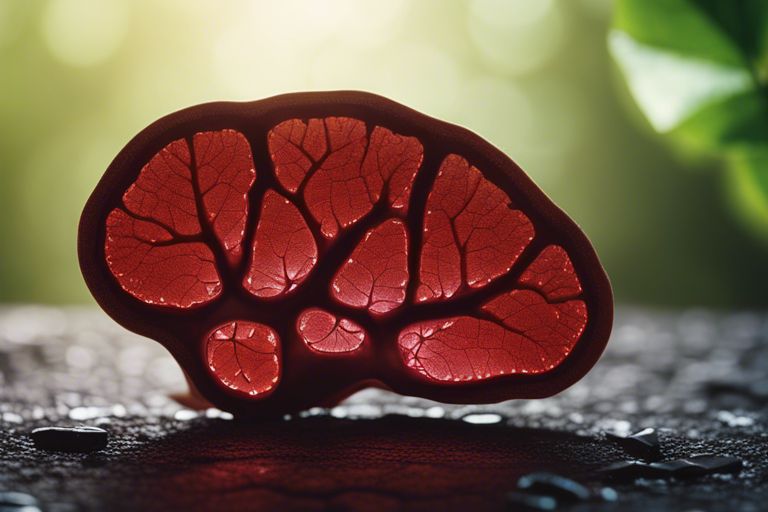With the rising popularity of kratom as a natural remedy, it’s crucial to shed light on its potential danger to one vital organ – the liver. As we examine into the topic of whether kratom is harmful to the liver, we unearth factual evidence and warnings that every kratom enthusiast should be aware of. Prepare to uncover the truth behind the impact of this trending herb on your liver.
Key Takeaways:
- Kratom can be harmful to the liver: Consuming kratom, especially in large quantities or over an extended period, can potentially cause liver damage.
- Monitor liver health when using kratom: Regularly checking liver function tests is important for individuals who use kratom to ensure early detection of any liver issues.
- Consult a healthcare professional: Before using kratom, it is crucial to consult with a healthcare provider, especially if you have preexisting liver conditions or are taking medications that could interact with kratom.

The Rise of Kratom
Kratom’s growing popularity
A rise in the popularity of kratom, a tropical evergreen tree indigenous to Southeast Asia, has been observed in recent years. Kratom, scientifically known as Mitragyna speciosa, has gained traction in the United States and beyond, where it is marketed as a natural remedy for various ailments.
Why people use kratom
With the growing interest in alternative medicines and holistic approaches to health, kratom has piqued the curiosity of many seeking relief from pain, anxiety, and depression. Its potential to stimulate the mind and body, as well as relieve discomfort, has made it a popular choice among individuals looking for an organic solution to their health concerns.
The Liver’s Role
What the liver does
Some research suggests that kratom may have adverse effects on the liver. To understand the impact of substances like kratom on this vital organ, it’s necessary to first grasp the liver’s role in the body. The liver is a powerhouse organ responsible for detoxifying harmful substances, metabolizing drugs, producing proteins necessary for blood clotting, and aiding in digestion by generating bile.
Importance of liver health
With the liver being such a multifaceted organ, maintaining its health is crucial for overall well-being. The liver plays a vital role in filtering blood and removing toxins, ensuring the body functions properly. Many factors, including excessive alcohol consumption, poor diet, and certain medications, can damage liver cells and impair its function. It’s critical to prioritize liver health to prevent serious conditions such as liver cirrhosis or liver failure.
Does kratom pose a threat to the liver? While more research is needed to fully understand the extent of kratom’s impact on liver health, it’s important to be cautious when consuming this substance, especially in high doses or in combination with other potentially harmful substances.
The Potential Dangers
To truly understand why kratom can be bad for the liver, it is important to research into the potential dangers associated with its use. While kratom may have some beneficial effects, it is crucial to acknowledge the risks it poses to liver health.
Kratom’s effects on liver enzymes
For some individuals, regular kratom consumption might lead to elevated liver enzymes. This can be a sign of liver inflammation or damage, indicating that the liver is working harder to process the toxins present in kratom. Elevated liver enzymes are a red flag that should not be ignored, as they can progress to more severe liver issues.
Reported cases of liver damage
Any substance that is metabolized by the liver has the potential to cause harm if consumed in excess or over an extended period. Unfortunately, there have been reported cases of individuals experiencing liver damage linked to kratom use. These cases highlight the importance of being cautious and informed when using kratom, especially in high doses or in combination with other substances that can strain the liver.
Liver damage caused by kratom can range from mild liver inflammation to more severe conditions like hepatitis or even liver failure. It is crucial to be aware of the signs of liver distress, such as abdominal pain, jaundice, or dark urine, and seek medical attention if any concerning symptoms arise.
The risk of liver failure
Reported cases suggest that in extreme situations, the use of kratom could potentially lead to liver failure, a life-threatening condition that requires immediate medical intervention. While not everyone who consumes kratom will experience such severe outcomes, the risk should not be underestimated. Liver failure is a serious consequence that underscores the importance of using caution and moderation when it comes to kratom consumption.
In some cases, individuals may not be aware of the impact that kratom is having on their liver until it is too late. The liver plays a vital role in detoxifying the body, and any compromise to its function can have grave consequences. It is crucial to prioritize liver health and be mindful of the potential risks associated with kratom use.

The Science Behind
Chemical composition of kratom
Science will tell you that kratom is made up of active compounds called alkaloids, with two key ones being mitragynine and 7-hydroxymitragynine. These alkaloids interact with opioid receptors in the brain, producing pain relief and sedation effects.
How kratom interacts with the liver
The chemicals in kratom are broken down in the liver. The liver metabolizes these compounds, which can lead to hepatotoxicity when taken in high doses or for prolonged periods.
The liver enzymes involved in this process can become overwhelmed, causing damage to liver cells and potentially leading to liver failure in severe cases.
Studies on kratom’s hepatotoxicity
On Dangers and Risk Factors of Kratom Liver Toxicity, researchers have conducted studies to explore the impact of kratom on the liver. These studies have shown that consistent use of kratom can lead to liver damage.
This research highlights the importance of being aware of the potential risks associated with consuming kratom, especially in high doses or over prolonged periods. Regular monitoring of liver function may be necessary for individuals who choose to use kratom.
Real-Life Examples
Personal stories of liver damage
Unlike many natural supplements, kratom has been associated with liver damage in some individuals. Personal stories of liver damage from kratom use are unsettling. Anecdotal evidence suggests that prolonged and excessive kratom consumption can lead to liver issues, including hepatitis and liver failure.
Medical professionals’ warnings
stories from medical professionals have also highlighted the potential dangers of kratom on liver health. Some doctors and researchers have cautioned against the use of kratom, emphasizing the need for more studies to understand its impact fully. For instance, a recent study published in the journal Drug and Alcohol Dependence found that kratom use was associated with serious liver injury in many cases.
The Regulatory Environment
Once again, the regulatory landscape surrounding kratom is complex and constantly evolving. As kratom gains popularity, especially in the West, governments are struggling to keep up with regulating this herbal supplement.
Current laws and regulations
On the federal level in the United States, kratom is not classified as a controlled substance, but the FDA has issued warnings about its potential risks. However, individual states have taken varying approaches, with some banning it outright and others regulating it as a dietary supplement.
Efforts to ban or restrict kratom
One of the main concerns surrounding kratom is its potential for abuse and addiction. Some lawmakers and medical professionals argue that kratom should be banned or heavily restricted due to its opioid-like effects and potential for adverse health outcomes.
It is crucial to consider the impact of banning or restricting kratom on the millions of individuals who use it for various purposes, including pain management and anxiety relief.
The role of the FDA
role The FDA plays a significant role in regulating dietary supplements like kratom. The agency has raised concerns about contamination, mislabeling, and the lack of standardized manufacturing processes in the kratom industry.
Another important aspect of the FDA’s role is its oversight of health claims made by kratom vendors. The agency cracks down on companies that promote kratom as a cure for serious medical conditions without sufficient evidence to support such claims.
Efforts to ban or restrict kratom have been met with mixed reactions from the public and the scientific community. While some advocate for stricter regulations to protect public health, others argue that kratom should remain accessible for those who benefit from its therapeutic properties. The role of the FDA in monitoring and regulating kratom is crucial to ensuring consumer safety and promoting transparency within the industry.
Can Kratom Use Lead to Liver Damage and High Blood Pressure?
There is a growing concern about the potential link between kratom use and high blood pressure. Several studies have suggested that kratom could lead to liver damage and high blood pressure. This has sparked a debate over the safety of using kratom as a natural alternative for managing pain and anxiety.
To wrap up
Taking this into account, it is critical to be aware of the potential risks associated with consuming kratom and its effects on liver health. While there may be anecdotal evidence of kratom’s benefits, it is imperative to consider the potential harm it can cause to the liver. As with any substance, it is important to approach kratom use with caution and be mindful of any adverse effects it may have on one’s health.
FAQ
Q: Is Kratom Bad for the Liver?
A: Yes, Kratom has been associated with liver damage and liver toxicity in some cases.
Q: What Causes Kratom to be Harmful to the Liver?
A: The exact reasons are not fully understood, but it is believed that certain components in Kratom may have toxic effects on the liver.
Q: What are the Symptoms of Liver Damage from Kratom?
A: Symptoms may include dark urine, jaundice (yellowing of the skin), nausea, fatigue, and abdominal pain.
Q: Can Kratom-Induced Liver Damage be Reversed?
A: In some cases, if the use of Kratom is discontinued early and the liver damage is not severe, the liver can regenerate and heal itself.
Q: How to Reduce the Risk of Liver Damage from Kratom?
A: To reduce the risk, it is advisable to use Kratom in moderation, avoid combining it with other substances that can stress the liver, and monitor liver function regularly if you are a regular Kratom user.









